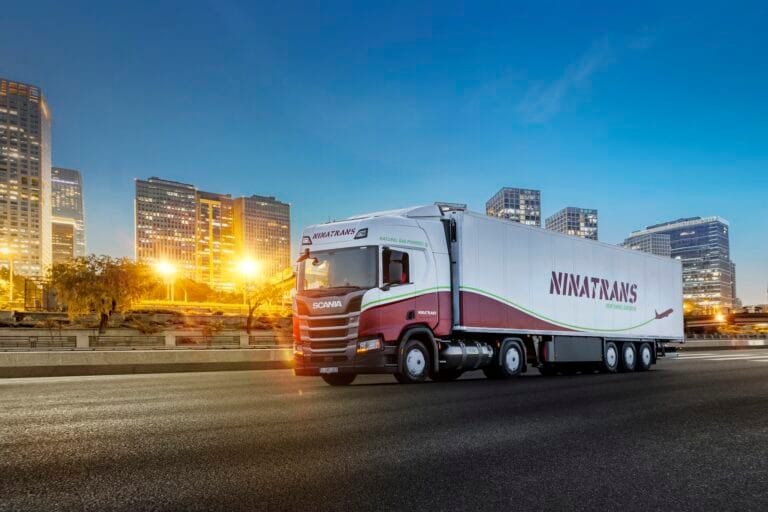Road feeder services (RFS) are the quiet workhorses of air cargo. Every day, trucks shuttle pharmaceuticals, e-commerce shipments and high-value goods between airports and final destinations. The sector is essential, yet also one of the hardest to decarbonise. As airlines face pressure to report emissions on their shipments, the road segment has emerged as a glaring weak point.
Benny Smets, CEO of Belgian haulier Ninatrans, knows the dilemma first-hand. “Electric trucks cost three times the price of a diesel truck… autonomy is not sufficient… there is not enough infrastructure available to recharge on time,” he said.
“Electric trucks are not yet scalable under current conditions, but we are building knowledge now to be ready when infrastructure and costs improve.”
Ninatrans, a family-owned firm founded in the 1950s, has always been early to test new ideas. Today it is running trials with battery-electric trucks on short-haul routes in Belgium. But the limits are clear.
“We are testing because we have to build knowledge and experience,” Smets explained. “But if you have to do long-distance runs, autonomy is not sufficient. And the infrastructure — charging stations with the right power — is simply not there yet.”
The financial challenge is just as stark. With an electric truck priced at more than three times the equivalent diesel model, fleet renewal at scale is unrealistic without subsidies or a breakthrough in battery technology. Smets does not reject electrification — but he views it as one part of a much longer journey.
Alternative fuels and incremental gains
While the industry waits for infrastructure to catch up, alternative fuels offer a more immediate path. Hydrotreated vegetable oil (HVO), a synthetic diesel that can be used in existing engines, and bio-LNG are both being explored as drop-in options.
Ninatrans is also taking the pragmatic route of incremental improvements. “It’s not only by using alternative energies, but also by using solutions like aerodynamics kits, which reduce consumption by 5 percent,” Smets said. For a fleet of hundreds of trucks, those savings are material.
This focus on incremental efficiency reflects the reality of RFS. Unlike airlines, which can switch to sustainable aviation fuel through joint procurement and blending mandates, truck operators work in fragmented networks where margins are tight and customer willingness to pay for greener options is limited.
Eco-combis: Efficiency through design
One of the more promising initiatives at Ninatrans is the use of eco-combi trucks. These vehicles are longer than standard units and can carry six airfreight pallets instead of four. The result is a direct cut in CO₂ emissions per pallet.
“By using eco-combis, you can immediately reduce CO₂ per pallet,” Smets explained. But there is a catch: regulation. At present, eco-combis can only operate in Belgium, the Netherlands and Scandinavia. For international RFS operators, that limits the benefit.
Ninatrans and other hauliers are lobbying the European Union to harmonise rules and allow cross-border use. Smets is convinced the case is strong: fewer trucks, fewer emissions, same safety standards. Until then, the full potential of eco-combis remains locked within national borders.
The push for greener RFS is not only coming from within the industry. Pharmaceutical shippers, e-commerce giants and high-value cargo owners are increasingly asking for CO₂ reporting. Airlines, under pressure to meet their own sustainability targets, are pushing the same requirements down the chain.
Smets sees both the opportunity and the challenge. “They invest a lot in getting the goods from one side of the world to the other, and then the last delivery is very important to confirm this perfect execution. We cannot allow ourselves to lose that,” he said.
The problem, however, is economics. Ninatrans is open to start initiatives together with customers, such as pilot-projects or con-investment initiatives.
“We need to move together as an industry, because the investment is too heavy for one company alone,” Smets argued.
A family ethos of early adoption
For Ninatrans, sustainability is not a new slogan but part of a broader family ethos. Founded in the 1950s and still run by the Smets family, the company employs more than 450 people. For Benny Smets, securing their livelihoods is his greatest responsibility. “My biggest achievement is that I can help them secure an income every month,” he said.
That ethos has translated into an openness to innovation. Ninatrans invested in digital systems before many peers, and it has taken the same approach with greener vehicles. Even when technology is imperfect, the company tests and learns. Smets sees this as vital preparation for the future, when regulation will tighten and customers will demand verifiable carbon reporting across the supply chain.
Smets is clear-eyed about the road ahead. There is no silver bullet for decarbonising RFS. Electric trucks will play a role, but only when infrastructure and costs align. Alternative fuels can bridge the gap, but supply and pricing remain uncertain. Eco-combis can deliver immediate gains, but only if regulators harmonise rules across borders.
“It’s not only by using alternative energies, but also by using solutions like aerodynamics kits… all these little things together are important,” he said.




